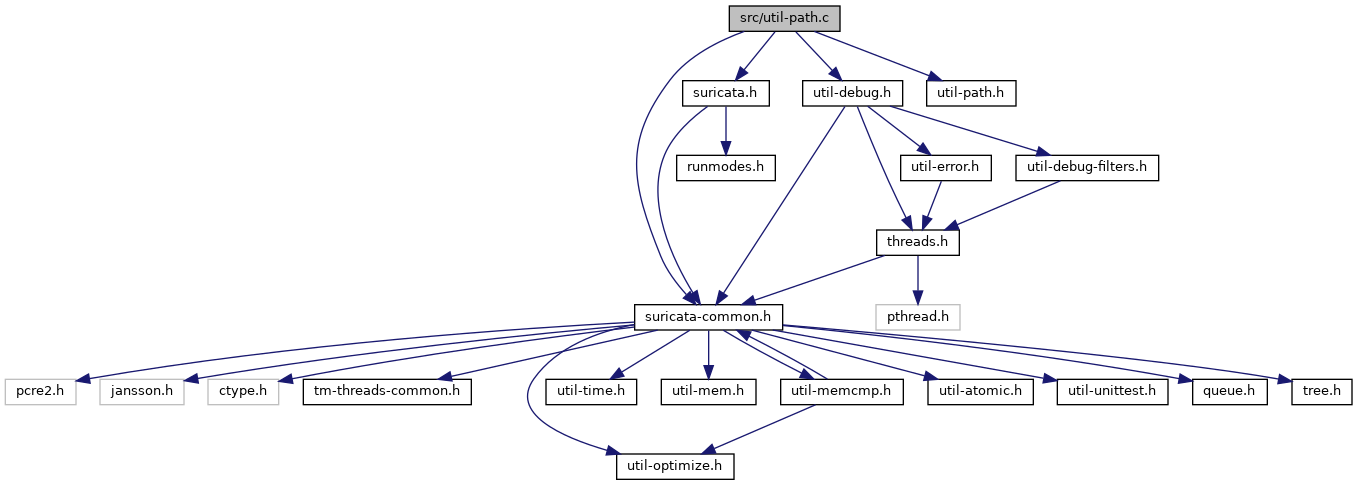
Go to the source code of this file.
Macros | |
| #define | DIRECTORY_SEPARATOR '/' |
Functions | |
| int | PathIsAbsolute (const char *path) |
| Check if a path is absolute. More... | |
| int | PathIsRelative (const char *path) |
| Check if a path is relative. More... | |
| int | PathMerge (char *out_buf, size_t buf_size, const char *const dir, const char *const fname) |
| char * | PathMergeAlloc (const char *const dir, const char *const fname) |
| int | SCDefaultMkDir (const char *path) |
| Wrapper around SCMkDir with default mode arguments. More... | |
| int | SCCreateDirectoryTree (const char *path, const bool final) |
| Recursively create a directory. More... | |
| bool | SCPathExists (const char *path) |
| Check if a path exists. More... | |
| bool | SCIsRegularDirectory (const struct dirent *const dir_entry) |
| OS independent wrapper for directory check. More... | |
| bool | SCIsRegularFile (const struct dirent *const dir_entry) |
| OS independent to check for regular file. More... | |
| char * | SCRealPath (const char *path, char *resolved_path) |
| OS independent wrapper for realpath. More... | |
| const char * | SCBasename (const char *path) |
| bool | SCPathContainsTraversal (const char *path) |
| Check for directory traversal. More... | |
| int | SCTouchFile (const char *path) |
| Update access and modification time of an existing file to 'now'. More... | |
Detailed Description
Definition in file util-path.c.
Macro Definition Documentation
◆ DIRECTORY_SEPARATOR
| #define DIRECTORY_SEPARATOR '/' |
Definition at line 34 of file util-path.c.
Function Documentation
◆ PathIsAbsolute()
| int PathIsAbsolute | ( | const char * | path | ) |
Check if a path is absolute.
- Parameters
-
path string with the path
- Return values
-
1 absolute 0 not absolute
Definition at line 44 of file util-path.c.
Referenced by PathIsRelative(), SCConfLogOpenGeneric(), SCConfYamlHandleInclude(), SCProfilingKeywordsGlobalInit(), SCProfilingPrefilterGlobalInit(), and SCProfilingSghsGlobalInit().

◆ PathIsRelative()
| int PathIsRelative | ( | const char * | path | ) |
Check if a path is relative.
- Parameters
-
path string with the path
- Return values
-
1 relative 0 not relative
Definition at line 69 of file util-path.c.
References PathIsAbsolute().

◆ PathMerge()
| int PathMerge | ( | char * | out_buf, |
| size_t | buf_size, | ||
| const char *const | dir, | ||
| const char *const | fname | ||
| ) |
Definition at line 74 of file util-path.c.
References strlcat(), and strlcpy().
Referenced by PathMergeAlloc().


◆ PathMergeAlloc()
| char* PathMergeAlloc | ( | const char *const | dir, |
| const char *const | fname | ||
| ) |
Definition at line 107 of file util-path.c.
References PathMerge(), and SCStrdup.

◆ SCBasename()
| const char* SCBasename | ( | const char * | path | ) |
Definition at line 249 of file util-path.c.
References DIRECTORY_SEPARATOR.
◆ SCCreateDirectoryTree()
| int SCCreateDirectoryTree | ( | const char * | path, |
| const bool | final | ||
| ) |
Recursively create a directory.
- Parameters
-
path Path to create final true will create the final path component, false will not
- Return values
-
0 on success -1 on error
Definition at line 137 of file util-path.c.
References len, SCDefaultMkDir(), and strlcpy().

◆ SCDefaultMkDir()
| int SCDefaultMkDir | ( | const char * | path | ) |
Wrapper around SCMkDir with default mode arguments.
Definition at line 123 of file util-path.c.
References SCMkDir.
Referenced by SCCreateDirectoryTree().

◆ SCIsRegularDirectory()
| bool SCIsRegularDirectory | ( | const struct dirent *const | dir_entry | ) |
OS independent wrapper for directory check.
- Parameters
-
dir_entry object to check
- Return values
-
True if the object is a regular directory, otherwise false. This directory and parent directory will return false.
Definition at line 200 of file util-path.c.
◆ SCIsRegularFile()
| bool SCIsRegularFile | ( | const struct dirent *const | dir_entry | ) |
OS independent to check for regular file.
- Parameters
-
dir_entry object to check
- Return values
-
True if the object is a regular file. Otherwise false.
Definition at line 218 of file util-path.c.
◆ SCPathContainsTraversal()
| bool SCPathContainsTraversal | ( | const char * | path | ) |
Check for directory traversal.
- Parameters
-
path The path string to check for traversal
- Return values
-
true if directory traversal is found, otherwise false
Definition at line 271 of file util-path.c.
◆ SCPathExists()
| bool SCPathExists | ( | const char * | path | ) |
Check if a path exists.
- Parameters
-
Path to check for existence
- Return values
-
true if path exists false if path does not exist
Definition at line 183 of file util-path.c.
◆ SCRealPath()
| char* SCRealPath | ( | const char * | path, |
| char * | resolved_path | ||
| ) |
OS independent wrapper for realpath.
- Parameters
-
path the path to resolve resolved_path the resolved path; if null, a buffer will be allocated
- Return values
-
the resolved_path; or a pointer to a new resolved_path buffer
Definition at line 234 of file util-path.c.
◆ SCTouchFile()
| int SCTouchFile | ( | const char * | path | ) |
Update access and modification time of an existing file to 'now'.
- Parameters
-
path The file path to touch
- Return values
-
0 on success, -1 on failure
Definition at line 286 of file util-path.c.
